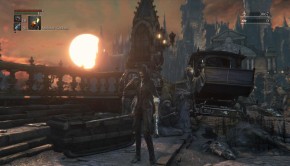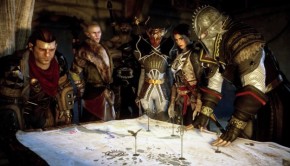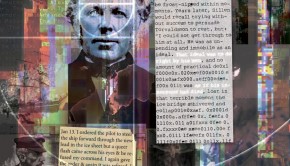Octodad: Dadliest Catch: Eight Arms to Hold You
 We’re all getting older, game designers too, and the proof is right there in their work. Instead of fighting to save their mega-hot girlfriends, our heroes now find themselves reluctantly protecting a precocious young girl. It makes perfect sense that, as game designers become dads, their protagonists become dads, too. “Something I saw at home this morning” is number 3 on the list of things that inspire game designers, right after Aliens and Lord of the Rings.
We’re all getting older, game designers too, and the proof is right there in their work. Instead of fighting to save their mega-hot girlfriends, our heroes now find themselves reluctantly protecting a precocious young girl. It makes perfect sense that, as game designers become dads, their protagonists become dads, too. “Something I saw at home this morning” is number 3 on the list of things that inspire game designers, right after Aliens and Lord of the Rings.
Yet there’s something slightly off about these new dads. They become fathers reluctantly, and they want to get too attached. They have gritty pasts and dark secrets. Their “children” are almost always adopted foundlings, not blood relatives; it’s easier to explain the mother’s absence if she never existed in the first place. With the right cuts, fatherhood can be turned into a monomythic power fantasy like any other. Really, for all of the talk of the “daddening” of video games, these characters are barely fathers. Surly babysitters, maybe. As long as the kids don’t interfere with the shooting and looting.
 Because it’s the shooting and looting that’s important, isn’t it? The video game bits. The kids are always there but also they’re not; unkillable ghosts in the machine, invisible to opponents, glitch-warping, insubstantial, item-spawning. Infans ex machina. These children may be crucial to the narrative, but in the game world they’re just one more minimally implemented game system.
Because it’s the shooting and looting that’s important, isn’t it? The video game bits. The kids are always there but also they’re not; unkillable ghosts in the machine, invisible to opponents, glitch-warping, insubstantial, item-spawning. Infans ex machina. These children may be crucial to the narrative, but in the game world they’re just one more minimally implemented game system.
 The only video game father I could ever relate to was Silent Hill’s Harry Mason. There’s nothing reluctant or detached about Harry; he loves his daughter, and he’d do anything for her. He loves her so much that he will literally go through Hell to get her back. He’s also not a very good video game hero. He’s a terrible shot, can’t sprint more than a few feet, and is easily startled. But he never gives up. He has no idea what he’s doing and makes mistakes frequently, but he loves his daughter and just keeps pressing on.
The only video game father I could ever relate to was Silent Hill’s Harry Mason. There’s nothing reluctant or detached about Harry; he loves his daughter, and he’d do anything for her. He loves her so much that he will literally go through Hell to get her back. He’s also not a very good video game hero. He’s a terrible shot, can’t sprint more than a few feet, and is easily startled. But he never gives up. He has no idea what he’s doing and makes mistakes frequently, but he loves his daughter and just keeps pressing on.
Isn’t that what fatherhood is about? Every dad feels like he’s in way over his head, like he’s making it up as he goes along. Like he’s probably failing his children in ways he doesn’t even realize. But also that he can’t give up, no matter what, dammit, because he’s the only dad his kid has. He may not be a perfect father, but he can still be the best one he knows how. Harry is a terrible video game hero but a great dad.
 So what about Octodad? The game’s tagline explains the high concept: “Loving Father. Caring Husband. Secret Octopus.” Octodad’s heart is in the right place; his legs are not. So while his family may be blissfully in the dark, the player is only too acutely aware of Octodad’s cephalopodic origins. His stretched out legs may go where you place them, but his torso’s will follow behind at its own pace. It’s not precisely accurate to say you “control” Octodad’s arms. Make suggestions, sure, but the arms maintain veto power. Octodad is a many-jointed force of nature who strews accidental mayhem in his tentacled wake.
So what about Octodad? The game’s tagline explains the high concept: “Loving Father. Caring Husband. Secret Octopus.” Octodad’s heart is in the right place; his legs are not. So while his family may be blissfully in the dark, the player is only too acutely aware of Octodad’s cephalopodic origins. His stretched out legs may go where you place them, but his torso’s will follow behind at its own pace. It’s not precisely accurate to say you “control” Octodad’s arms. Make suggestions, sure, but the arms maintain veto power. Octodad is a many-jointed force of nature who strews accidental mayhem in his tentacled wake.
 Octodad is hilarious! The stylized graphics and spot-on voice acting help sell the joke, but for the most part there’s just something inherently funny about the physical world. Buster Keaton, film’s greatest comedian, was a master at finding the humor in the gap between intent and result. Jurassic Park: Trespasser found unintentional humor in that same gap. (The intent was a revolutionary title with physics-based puzzles. The result was a disaster where it was an epic struggle simply to pick up a can of coke.) It’s no coincidence; Octodad developer Young Horses were inspired by Trespasser’s ridiculously messy physics, and have attempted to channel that game’s sublime accidental humor into something focused and intentional. Even terrible-runner simulator QWOP relies on the same joke: running should be easy, but physics make it hard. Players try their hardest, only to find the fundamental forces of the universe arrayed against them. Under these challenging conditions, the smallest success feels like an utter triumph.
Octodad is hilarious! The stylized graphics and spot-on voice acting help sell the joke, but for the most part there’s just something inherently funny about the physical world. Buster Keaton, film’s greatest comedian, was a master at finding the humor in the gap between intent and result. Jurassic Park: Trespasser found unintentional humor in that same gap. (The intent was a revolutionary title with physics-based puzzles. The result was a disaster where it was an epic struggle simply to pick up a can of coke.) It’s no coincidence; Octodad developer Young Horses were inspired by Trespasser’s ridiculously messy physics, and have attempted to channel that game’s sublime accidental humor into something focused and intentional. Even terrible-runner simulator QWOP relies on the same joke: running should be easy, but physics make it hard. Players try their hardest, only to find the fundamental forces of the universe arrayed against them. Under these challenging conditions, the smallest success feels like an utter triumph.
Isn’t that what fatherhood is about? Because your kids will fight you. They will not do what you want, and they will wear you down. They will not stop squirming when you need them to be still, and they will refuse to budge when you need them to get moving. They will break things, probably things you (used to) value. They will fall down, a lot. Under these challenging conditions, the smallest success–standing on two legs, using the toilet, eating all the peas–feels like an utter triumph.
 Octodad is brief, but to its benefit–jokes are funniest when they’re not run into the ground. Players looking for more to do can try a higher difficulty level, tracking down Octodad’s collectible neckties, or completing a level more quickly. (Has Awesome Games Done Quick added Octodad to the 2015 schedule? A 4-way competitive speedrun would be unbelievably entertaining.) There’s an extra ludicrous co-op mode that splits control of individual limbs between 2-4 players. Finally, Steam Workshop integration could lead to fan-made stages with new layouts, artwork, and even physical constants. Zero-gravity Octodad? Now I’ve seen everything.
Octodad is brief, but to its benefit–jokes are funniest when they’re not run into the ground. Players looking for more to do can try a higher difficulty level, tracking down Octodad’s collectible neckties, or completing a level more quickly. (Has Awesome Games Done Quick added Octodad to the 2015 schedule? A 4-way competitive speedrun would be unbelievably entertaining.) There’s an extra ludicrous co-op mode that splits control of individual limbs between 2-4 players. Finally, Steam Workshop integration could lead to fan-made stages with new layouts, artwork, and even physical constants. Zero-gravity Octodad? Now I’ve seen everything.
 Before playing Octodad, I was pretty sure I had the premise figured out. A besuited Octopus who flails his way through family life is a metaphor for fatherhood, right? Octodad is a father’s innate fear he’ll be “found out” as an impostor and exposed to the world as a fraud, given eight limbs and a tie. I was half right. That aspect is there, but it’s not the full story. What surprised me was the other half of the equation: the unwavering certainty Octodad’s family has in him, their eternal confidence in his ability to guide the family through anything life throws their way. They never doubt him for a minute. During the tutorial stage, when Octodad finally thrashes his way to his wedding aisle, his wife’s eyes bug out in disbelief. “Honey!” she says. “You look so handsome.” That’s when I knew I loved Octodad.
Before playing Octodad, I was pretty sure I had the premise figured out. A besuited Octopus who flails his way through family life is a metaphor for fatherhood, right? Octodad is a father’s innate fear he’ll be “found out” as an impostor and exposed to the world as a fraud, given eight limbs and a tie. I was half right. That aspect is there, but it’s not the full story. What surprised me was the other half of the equation: the unwavering certainty Octodad’s family has in him, their eternal confidence in his ability to guide the family through anything life throws their way. They never doubt him for a minute. During the tutorial stage, when Octodad finally thrashes his way to his wedding aisle, his wife’s eyes bug out in disbelief. “Honey!” she says. “You look so handsome.” That’s when I knew I loved Octodad.
As gamers, we tend to view game worlds through a solipsistic lens: Who am I? Who are these other guys? What can they do for me? That’s probably why children in so many games fall flat; undeveloped as their own characters, they’re just adjuncts to the protagonist. Octodad uses slapstick comedy and chaotic control to make an important point about fatherhood: this isn’t about you. Not entirely. You have to give up some control, and you won’t be completely in charge, but it’s worth it, I promise.
 That’s what I think fatherhood is about.
That’s what I think fatherhood is about.
Young Horses’ first game is as confident and ridiculous as its bumbling, burbling protagonist. The game succeeds because, like his family, Octodad’s creators believe in him and love him free from doubt. At some point, I may have described Octodad: Dadliest Catch as a game about “an octopus pretending to be a father.” I was wrong, and I apologize. Octodad is an octopus, and he can’t walk worth a damn. But he’s not “pretending” to be a loving father or a caring husband. He is. Octodad’s the real deal.
3 Responses to Octodad: Dadliest Catch: Eight Arms to Hold You
Leave a Reply
You must be logged in to post a comment.











I’ve just become a dad some month ago and it feels just like that.
So when did the GIA come back?
I’ve read by chance your pokèmon puzzle league review (and the tetris attack review too) and I loved them. then I’ve discovered it was an archive and the site was closed and I felt sad. then I discoverd the site was open again and I was happy. all this things happened in a matter of minutes about 10 minutes ago andn now you have a new regular reader.
edit. by the way this octodad article is great too.